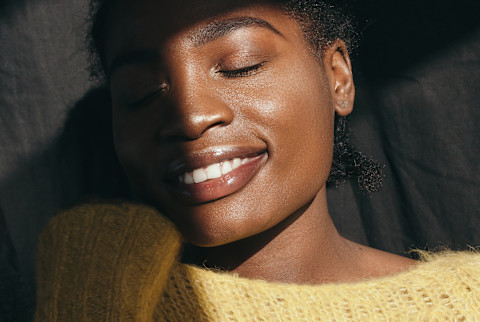New Research Suggests This Vitamin May Help Protect Skin From UV Exposure

Something you're probably already doing? Including vitamins in your skin care routine—be it a hydrating vitamin E serum or a topical vitamin C treatment to improve skin tone. Eating with your skin in mind is just as important, and a new study suggests that one of the most popular topical ingredients may just be worth adding to your diet, too.
Another convincing reason to eat foods with vitamin B3
Topical uses of vitamin B3, also known as niacinamide, is extremely popular in skin care. With benefits like helping to decrease hyperpigmentation, diminish fine lines, and manage acne, the ingredient can be helpful for a myriad of skin concerns. But new research, which was presented at the 29th European Academy of Dermatology and Venereology (EADV) Congress this weekend, found that this powerful vitamin may also help with another area of concern, ultraviolet (UV) exposure, through nontopical uses.
"Our study indicates that increasing the consumption of vitamin B3, which is readily available in the daily diet, will protect the skin from some of the effects of UV exposure," says Lara Camillo, a researcher who worked on the project. "However, the protective effect of vitamin B3 is short-acting, so it should be consumed no later than 24 to 48 hours before sun exposure."
In order to test the efficacy of vitamin B3 consumption for protecting skin cells, the researchers treated individual cells with nicotinamide, a form of B3. They then introduced those cells to UV exposure and saw that the vitamins helped protect the cells from oxidative stress.
How to get more vitamin B3 in your diet
As mentioned by Camillo, one of the best things about this new knowledge is how easy it is to integrate sources of vitamin B3 into your diet. Though they mention consuming it within the day or two before your sunny plans, it may be worth just considering working these foods into your diet on a regular basis—after all, we wear our SPF every day even if we don't plan a jaunt into the sunshine, right?
- Nutritional yeast (¼ cup): 46 mg
- Peanuts (1 oz.): 4 mg
- Mushrooms (1 sliced cup): 2½ mg
- Lentils (1 cooked cup): 2 mg
- Coffee (1 brewed cup): 2 mg
- Whole-wheat bread (1 slice): 1½ mg
- Chicken (3 oz.): 9 mg
- Salmon (3 oz.): 8½ mg
The takeaway.
What we eat affects our skin; this we know to be true. But it's always a delight to see the various unique ways certain ingredients actually do so. In the case of vitamin B3, we've been fans of using it topically for some time—so hearing that eating it may help ease and prevent sun damage? Well, now we're fully on board.
